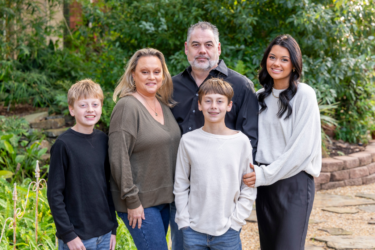If you could relive one of your favorite summer memories as a kid, what would it be? Would it be searching for seashells and hermit crabs on the beach with your family? What about riding your bicycle or skateboard through the neighborhood with your friends? Or, would you pick a time where you were attending summer camp and learning a new skill?
No Instructions Included
The simplicity of being just a kid is sweeter than a fresh watermelon on a hot day. For approximately 200 days, kids are bombarded with pressures of succeeding academically. There is no better time than summer break to reward them with the chance to experience the freedom to learn and play their own way. When kids do an activity that doesn’t involve direction or require a specific outcome, it is called unstructured play.
Unstructured play provides kids the chance to focus on pursuing their interests and bond with loved ones. It is basically creative free play with endless possibilities. For example, Jovi Tomeny, a local hair salon owner, says “Besides swimming, my children enjoy going to places like Knock Knock Children’s Museum when they are out of school.”
Off to Summer Camp
It’s difficult to manage a demanding work schedule with having kids out. Luckily, there is the option of bringing your kids to summer camp. Even though summer camp is still structured, it is more flexible than the school routine and provides time for spontaneous play. The advances of technology have made finding good fitting summer camps less difficult than finding a great pair of jeans. Searching the web and reading reviews is not the only way to research camps that catch your child’s interest. There are also camp fairs. Some camp facilities provide tours and/or meetings with a service rep.
Even though traditional summer camps are popular, there are many other types available. If your child enjoys a specific subject, there are camps that specialize in that subject. Some examples are art camp, basketball camp, space camp, and theatre camp. There are even local summer camps for children with special needs, such as Louisiana Lions Camp in Leesville.
Set Them Free
The next step is deciding on how long your child should attend camp. Some camps run daily while others run weekly or monthly. The ones that have weekly or monthly schedules are usually overnight camps or residential camps. Day camps provide your child with the opportunity to develop new skills while they socialize with new friends. Overnight camps provide much of the same, but your child would have a taste of independence in a supervised setting.
It’s never too early to teach your children what it takes to be independent. While attending camp, they will learn to become more self-reliant as they explore their interests. They will discover their strengths and weaknesses. Instead of depending on a teacher or you to tell them what to do, they will learn to trust their inner voice. It’s beneficial to put your children in summer camps, but it’s also important to leave some time open.
System Overload
Even though summer camp is not as structured as school, your child still uses a lot of energy, physically and mentally. After interviewing 80 mental health professionals and educators, 60 parents, and 100 children, Andre Aelion Brooks, author of Children of Fast-Track Parents, concluded that exposing children to extracurricular activities too early is not necessarily a good idea. She states that some children cannot function well with so many responsibilities and can develop stress disorders.
If you notice unusual changes in your child’s behavior, change his schedule. According to child psychiatrist, Alvin Rosenfeld, M.D., co-author of The Overscheduled Child, “Many overscheduled kids are anxious, angry, and burned out. They show a range of symptoms from headaches and stomachaches to temper tantrums, an inability to concentrate, and sleeping problems. In the long run, it may be harder for them to make confident choices about what they want to do on their own.” Children need time to recharge and process what they learn.
Sarah Schnauder, Camp Director at Kid-Possible, says “I think two or three specialty camps mixed into your child attending a well-rounded day camp gives your child time to really focus their mind on something new without overexposing their already growing brains.”
Having a planner just for your children’s summer schedule could prevent a lot of stress. After you list each activity and vacation, highlight unstructured or free time. If their schedule is weighted too much in one direction, make changes. Always include them when changes need to be made. Ask them if their days are too busy, or if they want more downtime. If it’s not possible for them to stay at home alone, ask for help.
The Balancing Act
We live in a high-achieving world. Social media has made parenting feel like a sport. Many parents believe that others would view them as bad parents if they deprived their kids of activities. It is natural to feel stressed about this, but it is good to prevent your child from getting ‘summer brain drain.’ However, it is essential to focus on what your children need to have a fun, productive summer.
Courtney Elkins Borland, a mother of a nine year old, expresses that she was more influenced by social media when her son was younger, but things have changed. Borland states, “As he has gotten older, I try to allow him to have a voice in his extracurriculars. I tried to introduce him to many things at a young age, but now he can cultivate his interests rather than what I envision.”
Imagine a see-saw. If the weight is on one side, the sea-saw wouldn’t move. Balance is key. For instance, Borland’s son attends four camps each summer, but he also enjoys spending time writing stories. As Aristotle once said, “Eudaimonia (the means of becoming a wholly, fully functioning person) can be achieved though the principle of the mean: moderation in all things.” In other words, happiness comes from the balance of vice and virtue, not perfection.





